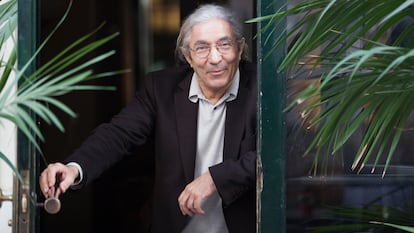The Franco-Argelino writer Boalem Sansal, who is imprisoned in Algeria accused of attacking state security, suffers from cancer and is being treated, explained his lawyer in France, François Zimeray on Tuesday. “It’s a cancer that hits men at a certain age,” Zimeray said in an interview in the public chain France Interwithout revealing more details. The accusations against him, “State security attack”, are very serious and can lead to very high penalties if it is finally prosecuted.
Sansal, 75, one of the most important writers, translated and read in the French language, the Peace Prize of the German booksers and a novel award of the French Academy, has been imprisoned in Algeria for three months, after being arrested to His arrival at the Algiers airport on November 16. He was transferred in December to the Penitentiary Pavilion of the Mustafa Hospital of the Algerian capital and is waiting for a judge to decide an appeal against his arrest.
Algerian President Abdelmadjid Tebún, referred to the arrest of the author of The oath of the barbarians (Alliance), The German village (The Aleph) or 2084: The end of the world (Seix Barral), which he described as a “imposter” sent by France, according to the TSA Digital Portal. “You send an imposter who does not know who he is, does not know who his father is, and then comes and says that half of Algeria belongs to another state,” said the president, who was re -elected in September with 95% of the votes between accusations of mass fraud.
The lawyer believes that Sansal – who according to his official documents is 75 years The prison and, although he has not been able to communicate directly with him, he has no reason to think otherwise. Zimeray complained that Algeria continues to deny access to her client and must work hand in hand with her team of lawyers in the country in North Africa.
Zimeray, who in the past trusted that the public outrage raised by the imprisonment of the writer and the pressure of France, even in a context of very degraded relations with the old colony, could lead to their release, is now less optimistic . “Today I don’t think we can expect a release that does not pass through the framework of a (judicial) process,” said the French lawyer. Under these conditions, the “unique realistic way to see him released” is that he has an equitable and impartial process, for which it is essential that he may exercise his right to defense with all his team of lawyers.
In the interview, the lawyer explained that to try to ensure a fair trial you have to protect Sansal from the “emotional” and “political” elements that surround this cause, including the “very degraded” relationship between Algiers and Paris. “We must not accept that it is the scapegoat of that relationship,” said Zimeray, which still see that the author can truly exercise his right to defense. Otherwise, Zimeray said they will report it.
Sansal’s arrest is framed within a growing diplomatic conflict between France and Algeria: in July, Algiers withdrew his ambassador to Paris when President Emmanuel Macron showed his support for the Moroccan plan for Western Sahara.
Life, and the work, by Boalem Sansal, by Mother Algerian and Moroccan father, naturalized French in 2024, has been marked by the independence of Algeria, the civil war and political repression in his country. Born in 1949 in THENIET the HAD, in the center of the country – ”next to the largest cedar forest in the world,” says the biography that accompanies the edition of his novels in the Quarto de Gallimard collection – studied engineering and worked as high official during a large part of his life.
The Algerian Civil War between the Salafista militias of GIA and the Army, during which it is estimated that 200,000 people died, made it a writer. He lived in Boumerdes, 50 kilometers from Algiers, one of the areas most hit by fighting and killings. Wrote on the endless nights of war The oath of the barbarians, A black novel where a resabied police endorsed corruption and religious fanaticism. “Men die like flies, the earth engulfs them, nothing makes sense,” he writes in the first paragraph of that overwhelming novel about violence.

